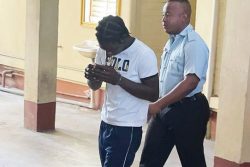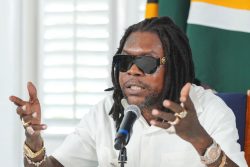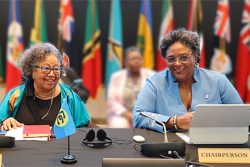Dear Editor,
One of the bases for opposition to the original draft of the US constitution, was that it appeared to place too much power in the hands of the Central Government, and this was seen as a prescription for potential abuse of the citizenry. In September of 1789, a Bill of Rights comprising the first ten amendments to the US Constitution was introduced and ratified by three quarters of the State Legislatures.
The US had cemented into its laws specific freedoms and rights for its citizens, in order to protect them against the inevitable abuses that are seemingly consequent on men getting their hands on too much power. Based on what we are witnessing in Guyana today, I seriously doubt whether a similar Bill of Rights would serve as a deterrent to those so intoxicated with power that they no longer seem to care about certain ethical fundamentals. Fundamentals they vehemently, and justifiably I might add, argued for on behalf of Roger Khan, but poignantly ignore in the situations of Victor Jones, Patrick Sumner, Alvin Wilson,and hundreds of others violently or fatally deprived of their citizenship rights to due process and the presumption of innocence.
The integrity and sense of balance any political state brings to its governance can be inferred from its willingness to, and assertiveness in, ensuring that the laws of the land are applied in a manifestly even handed fashion to all of its citizens.
And this should be done regardless of any variances in their perspective, their beliefs, or their physical characteristics and appearance. It is quite apparent that this political code of conduct does not resonate, even remotely, within the halls of power in Guyana. In fact, the contrary appears to be more obvious. Let’s make it plain here please. The political directorate in Guyana only seem to react with displeasure to law enforcement abuses when complaints of such emanate from enclosures they clearly consider to be part of their political constituency. We continue to do a bitter disservice to truth and plain talk by evading and avoiding the obvious in our circuitous analysis of this situation. The lesson, the cue to law enforcement, to the Army, is basically Pavlovian. And the reward and punishment has less to do with effective administration of justice, and more to do with harassment and intimidation of a population group increasingly cognizant that it is all boiling down to “just us”.
Rampant crime and corruption are scourges to the hopes and aspirations of all human societies. When such societies are small and embryonic democracies, the fallout is exacerbated. Obviously law enforcement, the police, have to be ever more diligent and innovative in their efforts to reduce and curtail activities associated with such scourges. But the police are not authorized to use criminal methods to fight crime and corruption. The police are not ethically sound when their aggressive pursuit of crime and wrong doing is selective and partial. And the political state loses its relevance as an authority when it becomes complicit in encouraging, or refusing to discourage, abuses by the Police that amount to transgressions against the law, and are contrary to a code of conduct to which their oath of office binds and obligates them.
Far too little indignation is being exhibited in response to what is apparent in Guyana today. And the “blowback”, if and when it comes, will have to be laid at the feet of those of us who “see these things in broad daylight, but are fearsomely waiting until night when we will require a torch light to examine them”. In a letter from his Birmingham prison cell in 1963 Martin Luther King Jr wrote, “Injustice anywhere is a threat to justice everywhere. We are caught in an inescapable network of mutuality, tied in a single garment of destiny.
Whatever affects one directly, affects all indirectly.” Guyanese of all descriptions, at home or abroad, need to recognize and understand that the criminal abuses of the state and its agencies cannot and will not be confined to the dustbins of posterity. The human rights of the individual in this 21st century are recognizably enforceable beyond narrow political and geographic boundaries.
Free and fair elections are not and have never been a panacea for democracy and fair and balanced governance. It is not that such elections are not essential pillars that make up the foundations of democracy. It is just that democracy cannot stand on just that pillar. The myopic reasoning that the wrongs and excesses in our society should be shunted aside and not ventilated because the political state secured a majority of Xs during an electoral exercise is ludicrous, and should be offensive to the intelligence of compos mentis Guyanese everywhere.
There are Guyanese with bruises and scars to show for their battles to win democracy for Guyana. And some of them are as critical of the attitudes and policies of those in power today, as they were of those of yesterday. The difference today, is that those who were cheering on the activism of these wounded patriots then, were doing so from a vantage point outside the ambit of power.
But now that they are on the inside with their hands on the reins of power, they consider such activism inconvenient impediments to their perceived entitlement to be the beneficiaries of absolute power.
Yours faithfully,
Robin Williams









